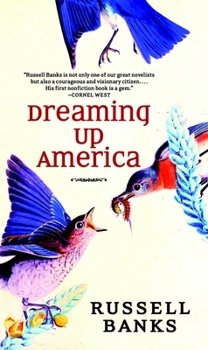Dreaming Up America
Select Format
Select Condition 
Book Overview
Russell Banks, uno de los narradores m s sobresalientes de la actual novel stica estadounidense actual, analiza en este breve, gil y esclarecedor ensayo la mentalidad del ciudadano norteamericano,... This description may be from another edition of this product.
Format:Hardcover
Language:English
ISBN:1583228381
ISBN13:9781583228388
Release Date:June 2008
Publisher:Seven Stories Press
Length:144 Pages
Weight:0.78 lbs.
Dimensions:0.7" x 5.3" x 9.6"
Customer Reviews
2 ratings
Holy smokes! Highly useful "braiding," as Banks calls it
Published by Thriftbooks.com User , 15 years ago
To add to review #1 (which is nicely complete), what I found useful was Banks' characterization of three "strands" in American psycho-history: 1) Escape from religious persecution, found a "new Jerusalem on a hill" (North-east); 2) "Mere" capitalism, exploitation, commerce (Mid-Atlantic, Caribbean. Spanish, mostly 3) Start from scratch, build a new life, find the fountain of youth. (many Europeans, including Ponce deLeon, of course, rummaging around in Florida. Banks calls these, in another articulation, the three Cs--Christianity, Capitalism and Civilization. Our big problem? The wee, itty-bitty delta between what we say and what we do. I've added the paragraphs to this one-paragraph excerpt, from pp 96, 97: Russell Banks-Dreaming Up America. 2008 p. 96 THE PERIOD we're going through right now in the US, in terms of Iraq and the Middle East particularly, in many ways isn't an aberrant period at all. It's typical of America's view of our proper relationship with the rest of the world. Not even the intensity of our involvement is aberrant. Look at Panama, at Vietnam, at Korea, Or, in the earlier nineteenth century, at the Philippines, at cuba. We are and historically have been very involved in other parts of the world, exploiting people and lands as much as any other colonial power, in Asian, African and South American countries. But in the American imagination, we're only doing that to avoid leaving them to their own terrible troubles. So there's a conflict between the reality of the nineteenth century -- between the nature of our involvement with Mexico, the Caribbean, Liberia, West Africa, and later our involvement in the Philippines and in Asia in the earlier twentieth century , and the rhetoric and imagery we use to describe that involvement. So much of American violence arises because of the conflict between the reality of our lives and the perception of our lives, the way we imagine ourselves. This goes back to the early colonists in New England and Virginia and the Carolinas, who were basically committing a kind of genocide against the native people, but claimed they were saving them for Civilization, Christianity, and Capitalism. In fact they were killing them and stealing their land, but they never looked at it that way. So there was a huge conflict between what they said they were doing and what they were actually doing. And that kind of conflict in any human being, in any people, makes for a predictable explosive violence. D.H. Lawrence said, "The essential American soul is hard, isolate, stoic, and a killer." He was pointing at the consequences of the American split between perception of self and reality. The killer is someone who would rather take a life than have to resolve that conflict between self-perception and reality.
Dreaming Up America
Published by Thriftbooks.com User , 16 years ago
This is a carefully constructed critique of American culture from the time of Columbus until the present. What we do today and how we think is driven by our background. We are a new country compared to much of the world. The factors that brought our forefathers to the Americas and the ease with which the European invasion expanded across the continent are major factors in who we are today. This book is drawn from interviews conducted in preparation for a documentary produced in France. In part, the intent was to correct images of America that non-Americans draw from popular movies. Banks has edited that material after the documentary has been translated into several languages. The maturity of the ideas in the book shows the refinement of this period of reflection. However, it still comes across at times that Banks is talking to a different audience than his countrymen. Many readers will consider that an enhancement since we too seldom try to look at ourselves as others see us. Early in the book, Banks introduces three factors (he calls them dreams) that he believes have strongly influenced us since colonial times, and are still a strong part of our national motivation. He terms those factors The City of Gold, The City on the Hill, and The Fountain of Youth. I urge readers to keep those factors in mind as they read and reread "Dreaming Up America." Other factors are important as well. Banks considers the Constitution and Declaration of Independence to be inspired documents whose full power hasn't yet been realized in American culture. Banks joins others in seeing racial influences at the root of every aspect of American society. Consider European treatment of the indigenous American people, slavery, and how our view of other people is influenced by whether they look like us or are different. Banks calls America "a country that was invented out of many parts" and thus we think and act differently than more homogeneous populations with longer histories. These various factors are often in opposition to one another. Thus our society is often under tension. At times this is positive; it motivates us to move ahead. Far too often it leads to violence, both within ourselves and our actions toward others. Not every reader will appreciate Banks' perspective. It would be unfortunate if that kept them from closely examining the points that he makes. Most Americans would benefit from reading this book twice through. It doesn't take long to read but the thought and discussions that it fosters endure much longer.






